KIDNAPPED GIRLS;AN INSIDE LOOK INTO CHIBOK GIRLS ROAD TO RECOVERY
Abuja, Nigeria (CNN)The heavy presence of armed guards at a nondescript building on the outskirts of Nigeria's capital is the only clue of its elusive residents -- the Chibok girls, many of whom are now young women.
CNN was given rare access to the facility in Abuja where the 21 young women released from Boko Haram last October have been staying and where the recently freed 82 young women will begin their road to recovery.
We met the 21 young women as well as Amina Ali, the first of those from Chibok who were found in May last year.
When CNN met Ali for an interview in August, she was a painfully shy and withdrawn 21-year-old.
Today she has had a complete transformation. Confident, she smiles as she applies makeup in the sparsely decorated room she shares with her daughter, Safiya.
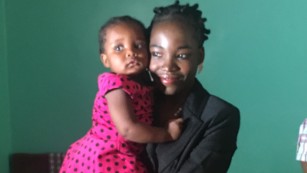
Amina Ali with her daughter Safiya.
Four of the 21 young women freed in October have babies who are looked after in a daycare center at the facility.
Finding normalcy
On a typical day, the young women take part in a structured program that starts with breakfast, vocational training and classes that include chemistry and English -- but there's also time to pray and unwind with games, says Rebecca Mallum, who acts as their unofficial spokesperson.
Mallum was among the three young women CNN spoke to -- they all had dreams of becoming doctors.
"I really enjoy tailoring and catering. I want to be a doctor in the future because I want to help people," she says.
Helin Musa begins her day with a prayer along with the others. After breakfast, she says she cleans her room, goes to class and plays handball during her downtime.
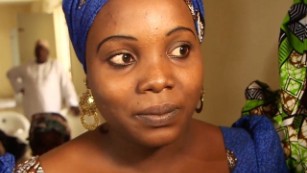
Helin Musa: "I want to be a doctor."
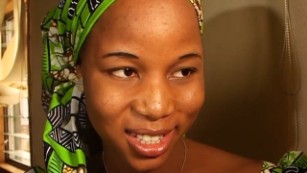
Agnes Gabani, 19, says she is happy.
"I want to be a doctor, I want to help so many people who are not feeling fine. I like biology, chemistry," she adds.
Agnes Gabani, 19, says she is happy at the facility and enjoys her classes.
"I like to do agriculture, biology, English, games. I want to be a doctor in the future. Many people are dying and I want to help them to survive."
There are also remedial classes to help them catch up on the years of education they missed.
"They were picked from school so education is key," says Nigeria's women's minister Aisha Alhassan, whose ministry oversees their welfare.
She added that the plan was to enroll the Chibok girls in formal education by September after a period of comprehensive rehabilitation and therapy.
The young women burst into song and dance sporadically and there's an easy camaraderie among them -- and they refer to each other as sisters.
When they learn they will be going to visit the newly freed 82 young women the following day, they erupt into applause.
"We are so very, very happy that our sisters are freed," Mallum says.
But behind their smiles and brightly colored clothes lurks memories of their dark past. One of them was absent to remove shrapnel still embedded in her body, Alhassan said.
Physical and emotional wounds
CNN was told that some of the them have shrapnel wounds from their time with Boko Haram and some still have sharpnel in their bodies that need to removed. But no further details were given about how many of them are being treated for this.
Among those looking after them is a "psycho-social" team that consists of a psychiatrist, psychologist and social worker. There's also a doctor on site and two live-in matrons, one of whom is from Chibok.
Their psychologist, who was not named for security reasons, tells CNN that the young women have made "tremendous improvement."
He said: "I remember vividly when they were first released, they had symptoms of PTSD, nightmares, insomnia. The girls are doing very well.
"We see each of them twice a week but we are called upon in acute cases to address particular issues regardless of the timetable."
The parents they left behind
However for all the progress they seem to have made, the government has been criticized for not allowing the families to have regular access to them.
Some family members have complained in the media and via the Bring Back Our Girls protest group that they have not been able to communicate with their relatives.
Aisha Yesufu, a member of the Bring Back our Girls movement told CNN: "We have an uncle here in the movement who in the early days could speak to his niece on the phone. Now he doesn't know where she is and he is not allowed to go and see her.
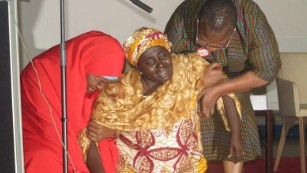
AGONIZED CHIBOK PARENTS STILL PRAYING FOR THEIR CHILDRENS RETURN 3 YEARS ON
"Parents should be allowed to see their children. They should be allowed to speak to them. We need transparency. We all have the same goals to rehabilitate and reintegrate them back in society."
However, Alhassan disputes the claims, saying all parents have access to their daughters.
"Parents have been to visit them here. They gave government consent for them to be here," she said.
"We didn't compel anybody. We also asked each girl individually what she wants and every month we assemble them and ask them if they want to go back home."
She added that they are not allowed to travel as a group because of security concerns and that one of the Chibok young women was currently visiting her parents on a two-week break.
"They are not kept here against their will. When we asked them if they wanted to go home for Easter ... they are still scared and they said they don't want to go back."
'Return home not wise'
Boko Haram's female victims often face stigma and abuse from their own community according to studies by various rights groups, including Human Rights Watch. Families often reject the unmarried young women who come back pregnant with Boko Haram babies.
Psychologist Somiari Demm says the situation is complex.
"The reality is I understand where the government is coming from... but I also understand the plight of the young women and their families.
"Separation is counterproductive to true healing. However, given the climate and situation in Nigeria, I don't feel a return home is wise.
"The government has to create an adequate system or infrastructure where these women can be with their families regularly, without compromising safety.
"This is imperative. These young women need to have as much contact with their family as they desire."
CNN was given rare access to the facility in Abuja where the 21 young women released from Boko Haram last October have been staying and where the recently freed 82 young women will begin their road to recovery.
We met the 21 young women as well as Amina Ali, the first of those from Chibok who were found in May last year.
When CNN met Ali for an interview in August, she was a painfully shy and withdrawn 21-year-old.
Today she has had a complete transformation. Confident, she smiles as she applies makeup in the sparsely decorated room she shares with her daughter, Safiya.

Amina Ali with her daughter Safiya.
Four of the 21 young women freed in October have babies who are looked after in a daycare center at the facility.
Finding normalcy
On a typical day, the young women take part in a structured program that starts with breakfast, vocational training and classes that include chemistry and English -- but there's also time to pray and unwind with games, says Rebecca Mallum, who acts as their unofficial spokesperson.
Mallum was among the three young women CNN spoke to -- they all had dreams of becoming doctors.
"I really enjoy tailoring and catering. I want to be a doctor in the future because I want to help people," she says.
Helin Musa begins her day with a prayer along with the others. After breakfast, she says she cleans her room, goes to class and plays handball during her downtime.

Helin Musa: "I want to be a doctor."

Agnes Gabani, 19, says she is happy.
"I want to be a doctor, I want to help so many people who are not feeling fine. I like biology, chemistry," she adds.
Agnes Gabani, 19, says she is happy at the facility and enjoys her classes.
"I like to do agriculture, biology, English, games. I want to be a doctor in the future. Many people are dying and I want to help them to survive."
There are also remedial classes to help them catch up on the years of education they missed.
"They were picked from school so education is key," says Nigeria's women's minister Aisha Alhassan, whose ministry oversees their welfare.
She added that the plan was to enroll the Chibok girls in formal education by September after a period of comprehensive rehabilitation and therapy.
The young women burst into song and dance sporadically and there's an easy camaraderie among them -- and they refer to each other as sisters.
When they learn they will be going to visit the newly freed 82 young women the following day, they erupt into applause.
"We are so very, very happy that our sisters are freed," Mallum says.
But behind their smiles and brightly colored clothes lurks memories of their dark past. One of them was absent to remove shrapnel still embedded in her body, Alhassan said.
Physical and emotional wounds
CNN was told that some of the them have shrapnel wounds from their time with Boko Haram and some still have sharpnel in their bodies that need to removed. But no further details were given about how many of them are being treated for this.
Among those looking after them is a "psycho-social" team that consists of a psychiatrist, psychologist and social worker. There's also a doctor on site and two live-in matrons, one of whom is from Chibok.
Their psychologist, who was not named for security reasons, tells CNN that the young women have made "tremendous improvement."
He said: "I remember vividly when they were first released, they had symptoms of PTSD, nightmares, insomnia. The girls are doing very well.
"We see each of them twice a week but we are called upon in acute cases to address particular issues regardless of the timetable."
The parents they left behind
However for all the progress they seem to have made, the government has been criticized for not allowing the families to have regular access to them.
Some family members have complained in the media and via the Bring Back Our Girls protest group that they have not been able to communicate with their relatives.
Aisha Yesufu, a member of the Bring Back our Girls movement told CNN: "We have an uncle here in the movement who in the early days could speak to his niece on the phone. Now he doesn't know where she is and he is not allowed to go and see her.

AGONIZED CHIBOK PARENTS STILL PRAYING FOR THEIR CHILDRENS RETURN 3 YEARS ON
"Parents should be allowed to see their children. They should be allowed to speak to them. We need transparency. We all have the same goals to rehabilitate and reintegrate them back in society."
However, Alhassan disputes the claims, saying all parents have access to their daughters.
"Parents have been to visit them here. They gave government consent for them to be here," she said.
"We didn't compel anybody. We also asked each girl individually what she wants and every month we assemble them and ask them if they want to go back home."
She added that they are not allowed to travel as a group because of security concerns and that one of the Chibok young women was currently visiting her parents on a two-week break.
"They are not kept here against their will. When we asked them if they wanted to go home for Easter ... they are still scared and they said they don't want to go back."
'Return home not wise'
Boko Haram's female victims often face stigma and abuse from their own community according to studies by various rights groups, including Human Rights Watch. Families often reject the unmarried young women who come back pregnant with Boko Haram babies.
Psychologist Somiari Demm says the situation is complex.
"The reality is I understand where the government is coming from... but I also understand the plight of the young women and their families.
"Separation is counterproductive to true healing. However, given the climate and situation in Nigeria, I don't feel a return home is wise.
"The government has to create an adequate system or infrastructure where these women can be with their families regularly, without compromising safety.
"This is imperative. These young women need to have as much contact with their family as they desire."


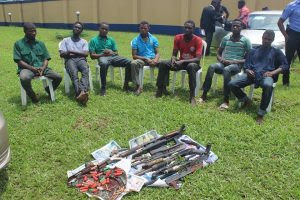



Comments
Post a Comment